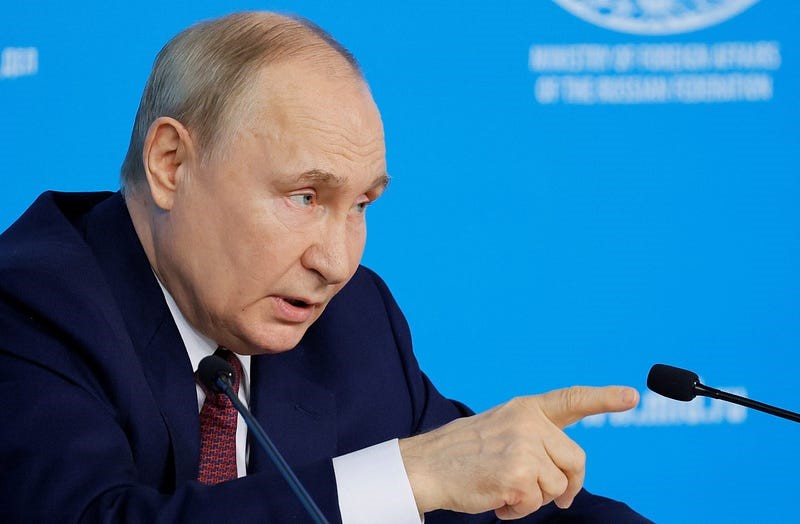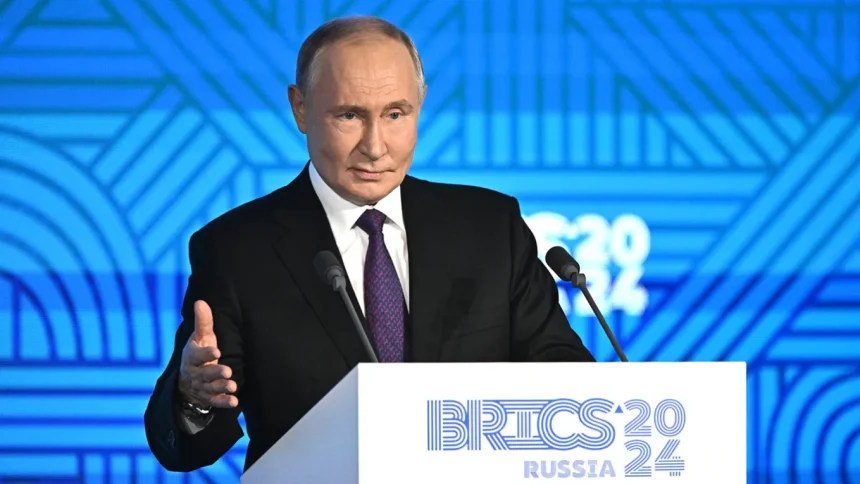In a significant move aimed at reshaping global financial systems, Russian President Vladimir Putin has called on members of the BRICS bloc—Brazil, Russia, India, China, and South Africa—to adopt cryptocurrencies and other digital currencies in their financial transactions. His objective is clear: reduce reliance on the US dollar and empower emerging economies to operate independently of traditional Western-dominated financial systems.
Speaking at a forum, Putin outlined his vision for BRICS to integrate cryptocurrencies into their daily financial dealings, stating that these digital assets could greatly benefit developing nations. His comments were widely covered by Russian media outlet RT and shared via the BRICS News channel on X (formerly Twitter), bringing global attention to his ambitious proposal.
Putin’s push for cryptocurrency adoption is rooted in a desire for financial sovereignty for BRICS and other developing economies. He emphasized that these digital currencies could streamline cross-border transactions, foster economic growth, and help emerging nations sidestep the influence of Western financial institutions.
“BRICS nations will discuss using digital currencies in investment and development projects, and it’s not just BRICS countries that will benefit from this transition—other developing economies can also take advantage,” Putin remarked.
However, Putin also acknowledged the inherent volatility and risks associated with cryptocurrency markets, calling for comprehensive regulation before the bloc fully adopts digital currencies. His remarks suggest that BRICS will take a cautious but strategic approach toward building a robust regulatory framework before diving into the widespread use of cryptocurrencies. He stressed the importance of establishing clear guidelines and a secure infrastructure to manage these digital assets within BRICS nations.

In addition to advocating for cryptocurrencies, Putin unveiled an even more ambitious initiative: BRICS Pay, a new payment platform designed to revolutionize cross-border financial transactions among BRICS members. The blockchain-based platform is envisioned as an alternative to the SWIFT system, which has been the global standard for international financial transfers for decades.
BRICS Pay represents a major milestone for the bloc, offering a system that could potentially sidestep US sanctions and reduce dependence on Western financial infrastructure. By leveraging blockchain technology, BRICS Pay promises to streamline financial transactions, reduce costs, and ensure faster, more secure cross-border payments within the BRICS jurisdiction.
READ ALSO: Israel’s Right and Duty to Retaliate: Israeli Envoy Responds to Iran’s Missile Attack
This new payment platform aligns with the long-term aspirations of BRICS members to create a self-reliant economic framework. One of the key goals of BRICS has been to reduce its dependence on Western financial institutions, which are often seen as tools of geopolitical leverage by the United States and its allies. By developing alternative systems like BRICS Pay, the bloc hopes to establish a more autonomous economic network that reflects the growing influence of emerging economies.
Putin’s remarks come at a time when cryptocurrencies and Central Bank Digital Currencies (CBDCs) are becoming increasingly popular across the globe. Several nations are exploring digital currencies as alternatives to traditional financial systems, driven by the desire for greater financial independence and efficiency in their transactions.
CBDCs, in particular, are gaining traction as governments seek to combine the benefits of digital currencies with the stability of state-backed assets. CBDCs are digital versions of a nation’s fiat currency, issued and regulated by a country’s central bank. These currencies provide a way for governments to modernize their financial systems while maintaining control over monetary policy.
Russia and China, two major players within the BRICS bloc, have already made public their plans to roll out CBDCs. Russia has announced its intentions to launch its digital ruble soon, while China is moving forward with its own digital yuan. However, China’s position on private cryptocurrencies remains complex due to a soft ban, although the country is heavily invested in blockchain technology and state-backed digital currencies.
The growing interest in digital currencies, both private cryptocurrencies and state-issued CBDCs, reflects a broader trend toward financial innovation and diversification. Putin’s proposal for BRICS to adopt cryptocurrencies is part of a larger effort by emerging economies to establish financial systems that are less dependent on the West, particularly the United States and its dollar-dominated financial architecture.
While the integration of digital currencies into BRICS economies is still in its early stages, the creation of BRICS Pay marks a significant step toward financial independence for the bloc. The potential for cryptocurrencies and blockchain technology to revolutionize international finance cannot be overstated, and BRICS members are positioning themselves to take full advantage of these developments.
By embracing digital currencies, BRICS nations hope to unlock new opportunities for economic growth, streamline international transactions, and reduce their vulnerability to external financial pressures. However, the path to widespread adoption is fraught with challenges, including the need for comprehensive regulation, technological infrastructure, and international cooperation.

Vladimir Putin’s call for BRICS to adopt cryptocurrencies and the launch of BRICS Pay represent bold steps toward reshaping the global financial landscape. As the world’s economic power shifts, the BRICS bloc is looking to assert its independence from traditional financial systems dominated by the West.
READ ALSO: UK Pledges to Clear Modern Slavery Case Backlog as Global Crisis Traps 50 Million People
By embracing digital currencies and blockchain technology, BRICS nations are setting the stage for a new era of financial innovation, one that promises to benefit not only the bloc but also other emerging economies around the world. While significant regulatory and technological challenges remain, the potential for these initiatives to reduce reliance on the US dollar and SWIFT, and to create more efficient, secure financial systems, makes this a transformative moment for BRICS and global finance at large.
The coming years will determine how effectively BRICS can leverage these digital tools to foster economic growth and greater financial sovereignty, but it is clear that the bloc is poised to play a major role in the future of international finance.

